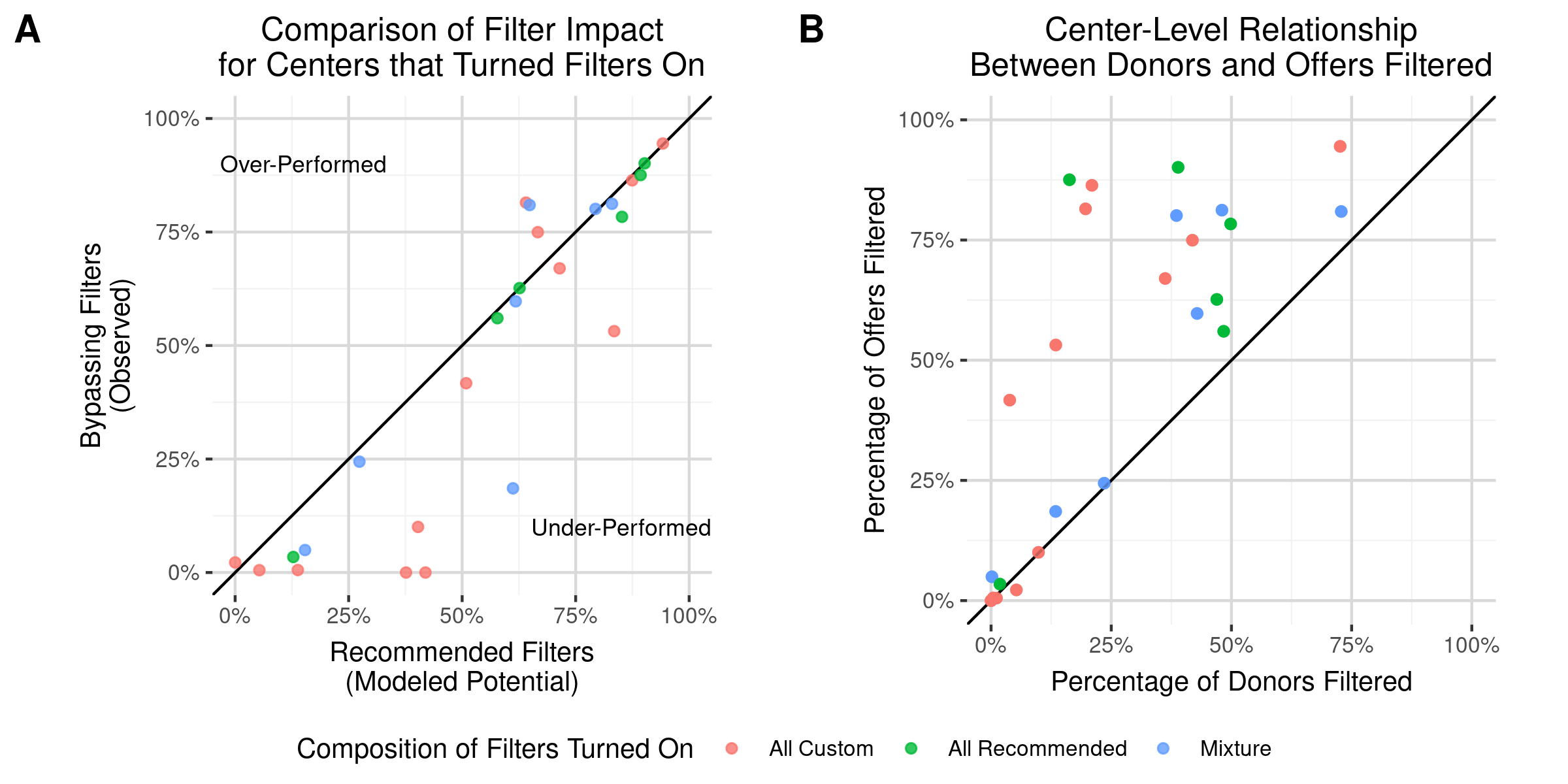Centers Avoided 67% of Kidney Offers by Participating in the OPTN’s Multifactorial Offer Filter Pilot Project
Research, United Network for Organ Sharing, Richmond, VA
Meeting: 2021 American Transplant Congress
Abstract number: 401
Keywords: Allocation, Cadaveric organs, Resource utilization, Screening
Topic: Clinical Science » Kidney » Kidney Deceased Donor Allocation
Session Information
Session Name: Kidney Deceased Donor Allocation 1
Session Type: Poster Video Chat
Date: Saturday, June 5, 2021
Session Time: 7:30pm-8:30pm
 Presentation Time: 8:00pm-8:10pm
Presentation Time: 8:00pm-8:10pm
Location: Virtual
*Purpose: Evaluate if multifactorial filters can reduce unwanted kidney offers to centers, thereby reducing administrative burden and getting to the accepting candidate quicker.
*Methods: 40 centers participated in the second phase of the OPTN Offer Filters Pilot which ran from August 26, 2020 to December 2, 2020. The OPTN pre loaded a set of machine learning-derived recommended filters for each center prior to the start of the pilot. Recommended filters were derived using recursive partitioning trees based on centers’ 2018-2019 acceptance practices and included donor profiles for which a center received offers from at least 20 donors with 0 acceptances. Centers were also able to create their own custom multi-factorial filters to reduce unwanted kidney offers. New in this phase, centers could exclude specific candidate groups from their filters (high CPRA, 0-ABDR mismatch, age limits). Additionally this phase introduced the ability to turn filters “on” to actually avoid receiving offers meeting filter criteria.
*Results: Over the course of the study OPOs attempted to send 368,508 offers from 2,983 unique donors to the 40 pilot centers. The set of recommended filters pre-loaded at the start of the pilot, had the potential to bypass 59% of those offers (48% of the donors at centers). Of the pilot centers, 26 elected to turn on bypassing for at least one filter. OPOs attempted to send 308,335 offers from 2,532 unique donors to these 26 centers. The centers’ bypass filters removed 206,933 (67%) offers. Individual center impacts ranged from 0% to 94% of offers filtered. Modeling closely predicted center performance (Fig 1A) despite centers not always using the set of pre-loaded recommended filters. Success in bypassing a large volume of offers was not associated with the number of filters turned on or the origin of filters (recommended vs custom). Of the 91 filters turned on for bypassing, 49 included candidate exclusion criteria. Some centers were very effective at filtering offers even from a small percentage of donors (Fig 1B).
*Conclusions: The Offer Filters Pilot demonstrated both the potential of multifactorial filters to reduce unwanted organ offers and the willingness of centers to turn these filters on for bypassing. Candidate exclusion criteria provide protections to centers hesitant to turn on filters that would apply to their entire list. A national implementation could save centers administrative time, decrease allocation time, reduce cold ischemic time, and help avoid discard.
To cite this abstract in AMA style:
Toll A, McGehee H, Stewart D, McTier R. Centers Avoided 67% of Kidney Offers by Participating in the OPTN’s Multifactorial Offer Filter Pilot Project [abstract]. Am J Transplant. 2021; 21 (suppl 3). https://atcmeetingabstracts.com/abstract/centers-avoided-67-of-kidney-offers-by-participating-in-the-optns-multifactorial-offer-filter-pilot-project/. Accessed February 18, 2026.« Back to 2021 American Transplant Congress

